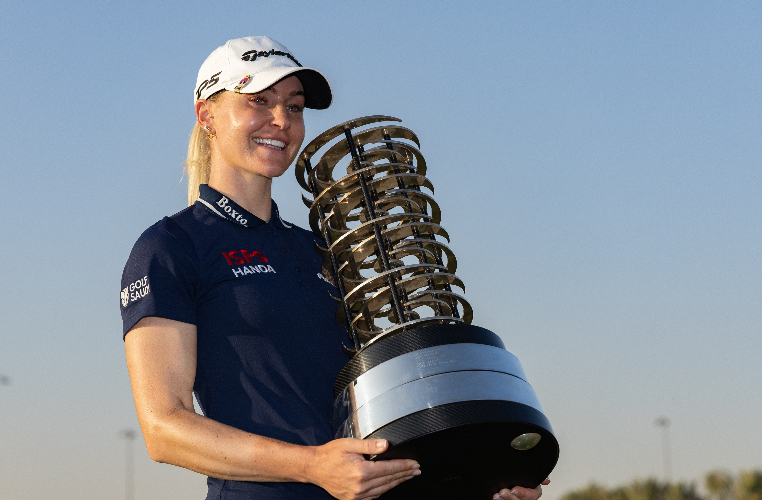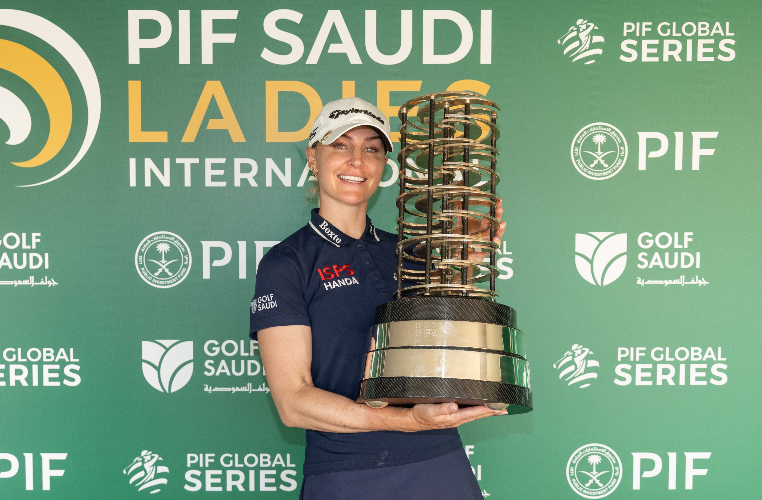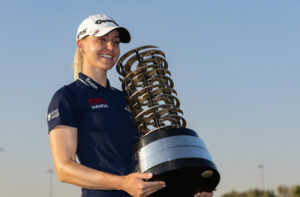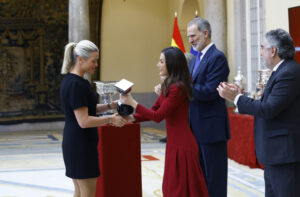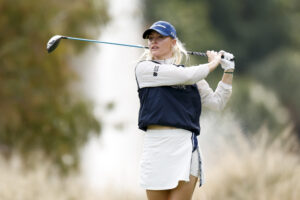“My boyfriend called, you know, on the landline back in the eighties. He said, Oh, my car won’t start. Do you mind if I pick you up on my motorcycle? And I’m 19. Oh, sure.”
Deborah Smith – tough love and second chances
Anyone who plays golf soon realises that occasionally we get a bad bounce, or once in a while, the ball will end up in a bad lie, even after a good shot. Likewise, life doesn’t always give us exactly what we deserve. So we can either stop, or we can move on, with an attitude that views the situation as an opportunity to learn. Call it perseverance, call it resilience, call it tenacity, call it whatever you like, but Deborah Smith has it in bucket loads and boy has she needed it.
Deborah is a survivor and embodies the term to its fullest. Surviving a horrific motorbike accident, hepatitis C, an amputation, depression, survivor’s guilt, and several bouts of cancer, is evidence that Deborah is made of strong stuff. And for the first 18 years, life had ticked along like a fine Swiss-made watch, never missing a beat, one mini success following the next, the stuff of a life well-lived.

As the eldest of four girls, Deborah grew up in Rockford, Illinois, and later lived in Iowa and North Carolina. Both of her parents had small businesses. Although the entrepreneurial couple had busy lives, they still made time to ferry Deborah to the usual round of after school activities. Dance lessons from the age of four, helped Deborah develop the passion for moving and then by the age of ten golf came into her life. “Mum and Dad were avid golfers and they signed me up for a series of golf lessons at the Rockford Park District”. Quickly golf took hold, “For my birthday I asked my parents to get me a summer pass for unlimited range balls at the golf course. So I would ride my bike there almost every day and I would hit a just huge, huge bucket of balls.”
As is the way, soon Deborah improved her skills and found herself on her high school golf team. It wasn’t long before she became the captain of the team which would compete in the state tournament. In the late 1970s, there were not many girls playing, so Deborah was fortunate to be at a high school that had enough girls good enough to compete, but she had already inherited her parents’ work ethic which she applied to golf, “As I took lessons, what I found was diligence, perseverance and practice were really the key to playing and having a consistent game.”
Deborah became a freshman at the University of Iowa, studying psychology, while satisfying her curiosity in art, dancing and playing golf. Life was good. She had returned to Rockford for the summer, got a summer job, had her nineteenth birthday, and it was late June. Deborah’s boyfriend, Ray, was due to pick her up on the way to a friend’s picnic, “My boyfriend called, you know, on the landline back in the eighties. He said, Oh, my car won’t start. Do you mind if I pick you up on my motorcycle? And I’m 19. Oh, sure I said.” It was the first time that Deborah had been on a motorbike. “We were broadsided and thrown 50 feet into a ditch. Ray was killed instantly, and I sustained injuries from head to toe.” Deborah’s face and arms were slashed when her head shattered the car’s windshield. The femur of her right leg was broken, and her lower leg crushed – essentially severed by the crash. Dealing with the loss of her boyfriend while she survived was a heavy burden. “Ray had been adopted from Sweden, and so to think that I survived and had three younger sisters and this poor family lost the only child they had. It was heartbreaking. I mean it still is to think about, it’s just, you know, how do I make my life worthy to be here?”
The practicalities of rehabilitation after the accident took hold. A full year off college for treatments and surgeries followed, and it is worth remembering that in the early eighties, prosthetics were not what they are today. When Deborah did return to college, it was as a sophomore, “I was using crutches the remainder of the time that I was at the University of Iowa. I was able to graduate in psychology with the help of a very good programme they had to help students with disabilities.”

The degree helped Deborah to reflect, and she had the opportunity to apply some of the learnings to her own situation, but there was a lot to deal with, “I was told that I may not walk again, or if I was able to then it would be using some assistive device.” Then there was the survivor’s guilt of being with someone that she cared about being killed in the same accident and the almost inevitable depression over the incredible changes that her life had taken with the physical issues she was facing. “I continued to have surgeries and problems. A couple of years after the accident, my leg looked like it had healed, but due to a bone infection coming back, the leg broke again. So I had to start from ground zero, which was very disheartening.” A dozen or more surgeries followed over the next five years. With so many operations, it is not surprising that Deborah needed several blood transfusions, an intervention that would leave a lasting legacy.
Fast forward 20 years and Deborah was married, had four children. Through persistence at least she could walk again. “I could walk, I couldn’t run, or do a lot of the activities that I wanted to, but I managed.” Deborah was living her life and was very aware of her body. It was this awareness and self advocacy that has helped her on more than one occasion. In 1998 she was inexplicably exhausted. “I got that feeling there was something that was not quite right, and so I pursued talking with doctors about it.” Unknowingly, Deborah had received a tainted blood transfusion, and so had acquired hepatitis C. The diagnosis came after the birth of her youngest child and resulted in daily chemotherapy for a year, to which she thankfully responded.
Another occasion occurred a decade later, when Deborah proactively sought treatment for what turned out to be cancer. “In 2008 I was diagnosed with head and neck cancer. I had a sore on my tongue that wasn’t healing, and I pursued with my dentist and asked for a biopsy. I had never smoked, I had no risk factors for that particular cancer, and I was very fortunate to be diagnosed early. The five-year survival rate for oral cancer is 50%. So certainly twelve years later I’m incredibly grateful to be here.”
All the while Deborah was dealing with multiple physical difficulties she realised she needed to summon up the courage to leave her increasingly difficult marriage, “There was a kernel in my mind that there had been something incredibly wrong about this relationship for a long time and he was very controlling.” She sought out a therapist, and in talking with her, Deborah says that she recognised that the way she was being treated was not acceptable nor reflective of a normal healthy relationship. To add to the load, Deborah was in great pain, “My ankle and my leg started to deteriorate rapidly resulting in another dozen limb salvage surgeries. The doctor had actually gone in and broken the two bones in my lower leg, tibia and fibula to try to better align them and put a spatial frame or an external fixator on my leg. This was the third that I’d had in my lifetime. It was not a successful procedure, and I was using either a walker or crutches all the time.” More surgery followed. Stress is cumulative in nature, physical stress, emotional stress, traumatic stress are just a few, but each adds to the next. For Deborah, her quota was far exceeded.
The stones in the path of the river give the water its music. Likewise, Deborah had certainly faced and dealt with many challenges up to this point. But there was more to come. Leaving her husband was one thing, but preparing for her new life was tough. It took time, but soon she realised that to reach out and ask for help isn’t a sign of weakness, but rather a sign of strength. “To be absolutely vulnerable like that is scary, but my family and friends really helped me through some very challenging times. It’s interesting that people I barely knew offered help, you know, came forward and I’m just really grateful to be where I am now.”
For 34 years, the effects of the devastating accident in 1981 were still impacting Deborah’s life. With all that had gone before Deborah was getting stronger. After all, it is said that what doesn’t kill you makes you stronger. By 2015 the pain, continual surgeries and rehabilitations were taking their toll. Deborah considered having an elective amputation. Finding the courage to leave her marriage, and everything that she had gone through before gave her the strength, “I think it helped me to find the courage I would need to have an amputation. The idea of taking off a part of your body is certainly intimidating and there’s no going back. My leg was an obstacle and a prosthesis was an opportunity.” Not everyone agreed, but many important people in Deborah’s life were supportive. “One surgeon flat out told me he thought I was crazy. When I told my daughter that I thought I was going to have an amputation, she said, Mom, I think you’ll be able to do so much more with your grandchildren than you can now. That was a real inspiration to me.”

Family is important to Deborah, and the lights of her life are her one daughter, three sons, three grandsons and a granddaughter. Golf is now back in her life after years of being shelved. Not only is she playing again, which she enjoys immensely, but Deborah is now also an adaptive coach. “I became involved in coaching through Freedom Golf Association, which is based in Chicago, and has a programme to train coaches.” Like many such programmes, which mixes theory and practice, the course gave Deborah the skills to introduce the game to others, “It’s fun to go into schools in the Chicago area and work with the special needs groups.” Deborah recognises the inclusive nature of golf, “It’s a game that you can play when you’re young and play throughout your following years. Even when you get older, even when you might develop a disability, it’s still available to you. Adaptive golf groups are making access possible and helping people to see that you can play even using a wheelchair, you can play if you have a vision impairment, or if like myself you use a prosthesis. I think it’s one of the few sports that you really can play for a lifetime.”
Deborah is a peer mentor with the Shirley Ryan AbilityLab in Chicago, an organisation that EDGA and the International Golf Federation works closely with. She also serves the Amputee Coalition, which is the largest non-profit that serves the limb difference community in the United States, and is a lead advocate to help bring awareness of some of the challenges within insurance and legislation in the United States.
Back in golf, the game that she took up some 40 years ago, Deborah feels good and she enjoys the camaraderie. Sharing time with others, asking for and giving help are all part of the joy of golf. “It’s necessary to reach out to others and ask for help when we need it. That was a very difficult lesson for me to learn, but I like to help others and I realised that it’s rewarding for others to help too.”
During the process of writing this story Deborah has encountered a new health challenge that she is all too familiar with. In early 2020 Deborah felt pain on the bottom of her tongue and discovered a lump that had not been present at her annual head and neck cancer check-up. A subsequent biopsy from a head and neck oncologist resulted in a diagnosis of oral cancer. “The lesion is near the spot where it occurred in 2008, so they consider it a new incidence.” Surgery to remove it has been completed, and soon Deborah will meet with her surgeon and another specialist to discuss the results and pathology of the tumour. “I may not be out of the woods yet. My ability to eat and speak is affected, just as it was 12 years ago, but thankfully I’m improving daily. My surgeon told me that in 2008 approximately 30% of my tongue was removed, but my recent surgery required less removal.” Deborah is keen to bring awareness to what she says is “an insidious sneaky cancer that many people are unaware of.”
With a death rate of 43% after five years, oral cancer is statistically more dangerous and kills more people annually than some more commonly known cancer variations, such as cervical cancer, Hodgkin’s lymphoma, laryngeal cancer, cancer of the testes, and many others. “I am grateful to have found this early and pursued treatment as soon as possible, as frequently oral cancer is discovered late in its development.”
Deborah tries to stay in the present moment and when asked what advice she would give to someone who has difficulties to deal with, Deborah reflects that when her Dad used to visit her in the hospital he’d say, “Keep your chin up.” Deborah advises, “Focus on where you are and make the best of each moment you have. Put your best foot forward and keep trying. Don’t give up, and then try to create a reason for what has happened in your life. I wear a necklace every day that is inscribed in Latin, ‘Solvitur Ambulando’, which broadly translates to – It is solved by walking the path.”
Deborah has and is walking her own path, one that has had a few obstacles to deal with, but she is putting her best foot forward one step at a time.
